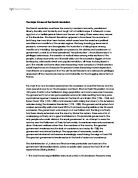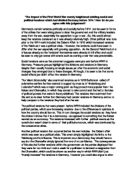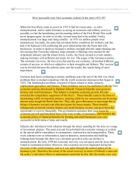To what extent does Stalin deserve the title of Red Tsar when assessing his rule in the context of Russian government from 1855- 1964?
To what extent does Stalin deserve the title of 'Red Tsar' when assessing his rule in the context of Russian government from 1855- 1964? When Stalin rose to power in 1929 he claimed to the Russian public that he was a devote follower of Leninism; his slogan 'Lenin is always with us'1 meant that Stalin wanted to show how similar he was to Lenin. However Stalin asserted his power at the head of government much like the Tsars by employing tactics of fear and propaganda. Stalin's personal dictatorship meant he had strong elements of being 'Red Tsar' as he established unquestionable rule, this idea of being a 'Red Tsar' came from the belief that Stalin wasn't committed to communism, as his traditional ideas were reminiscent of Tsarist autocratic rule, so effectively he was a fusion between the two ruling styles. As Stalin wished to portray himself as a 'God-like' figure; this made him an isolated leader who tolerated no criticism, similar to the style of ruling under the Tsars, as both leaders dismissed ministers at their own will and chose to act on their own personal feelings, for example like the Russification policy of employed by all the Tsars, but in particular Alexander II and the nationalistic policies of Stalin. Stalin's government was 'top-down'2, and unlike Lenin and Khrushchev, Stalin was very wary of how much his fellow party members knew. Therefore he employed a
Explain how the effects of the First World War caused the collapse of the Tsarist regime
) Explain how the effects of the First World War caused the collapse of the Tsarist regime (8 marks) There were many causes of the collapse of the Tsarist regime. One of the biggest causes, however, was the First World War, as it had many effects on everyone in Russia, who all blamed the Tsar. The Tsar abdicated in 1917 because he had no control over anyone in Russia. He had no support. This was because everyone in Russia blamed the Tsar for something. They layed all the blame at his feet because he was in charge and was the only person who could change things. One of the main reasons why the 1905 revolution failed was because the Tsar had the support and control of the military. By the time the 1917 revolution had started, the Tsar had lost this support and control. He had no protection. This happened because of the war. Firstly, the army was very poorly equipped, as some men didn't have any boots and only a third of men had rifles. The army also had very incompetent leaders. There is evidence of this in the battles at Tannenberg and the Masurian Lakes. In both of these, the 'huge Russian armies' (Brooman 1994) were wiped out when they should have easily beaten a single German army. The poor leadership combined with the poorly equipped army made Russia suffer many defeats in the war. By 1917, 0.8 million Russian troops had been killed, 4.6 million wounded and 3.3 million
Major Causes of French Revolution
The Major Causes of the French Revolution The French revolution overthrew the country's ancient monarchy, proclaimed Liberty, Equality and Fraternity and fought off a hostile Europe. It ushered in a new age, but at a terrible price in blood and human suffering. There were many causes of the Revolution. The French Revolution appears to have been the outcome of both long term and short term factors, which arose from the social and political conditions and conflicts of the ancien regime. The long standing grievances of peasants, townsmen and bourgeoisie; the frustration's of rising hopes among wealthy and 'middling' bourgeoisie and peasants; the distress and breakdown of government; a real (or at least perceived) 'feudal reaction'; the stubbornness of a privileged aristocracy; the creation of radical ideas among wide sections of the people; a sharp economic and financial crisis; and the successive triggers of state bankruptcy, aristocratic revolt and popular revolution: all these factors played a part. The middle and lower class were becoming more conscious of their increased social importance and because the peasants were becoming more independent, more literate and prosperous that the old feudal freedoms and aristocratic privileges appeared all the more burdensome and intolerable for the struggling discontents of France. For more than one hundred years before the accession
Was it the policies pursued by Henry VIII that caused "the mid-Tudor crisis"?
Was it the policies pursued by Henry VIII that caused "the mid-Tudor crisis"? "The mid-Tudor crisis" is a term often used by historians to describe the reigns of Edward VI (1547-1553) and Mary I (1553-1558). This period can be seen as a crisis, due to the fact that there were so many problems, financial, social, religious and constitutional, all of which led to rebellions, and placed the country in a very unstable position. It is clear that many of the origins of this 'crisis' have their roots in the reign of Henry VIII, especially in his final years, and therefore to an extent his policies were responsible for the 'mid-Tudor crisis'. He left a very difficult legacy to his successors, but it must be remembered that Somerset exacerbated the problems already in existence and Northumberland and Mary then had the difficult task of resolving them. Henry VIII on his own can not be held entirely responsible for the crisis, he was only one contributing factor. There were many underlying social and economic problems which his policies did not cause. Henry's policies relating to the constitutional difficulties can not be held to blame for the crisis. Indeed, during his reign, Cromwell's reforms had actually made the Tudor state more powerful, but "this advantage was weakened by a minority". Before he died in 1547, Henry had attempted to prevent a power struggle by setting up a
Assess the successes and failures of Mussolini's domestic policy.
Assess the successes and failures of Mussolini's domestic policy. Mussolini's primary aim in 1919 when he came into power was to fascitise the Italian nation as a whole, young and old; he wanted his nation to be utterly committed and disciplined towards the new fascist state rather than being passive and going along with everyone else. To achieve this goal, Mussolini set about trying to influence and ultimately change make domestic establishments more 'fascist', that is, to follow the principles of a very right-wing, nationalist totalitarian state in which the 'Duce is always right' and in which the principles of 'Believe, Obey, Fight' are considered paramount. Mussolini attempted to alter Church-state relations, to create the perfect fascist woman, to fascitise the educational system and the youths of Italy, to change Italy's economic and political structure, and to create a nation that would be respected by other nations, by using his strategies of the 'battle for land, grain and births' and by proving the strength of the nation through sporting achievements. However, Mussolini's policies failed to unite the country and fascitise the nation as a whole; his economic polices were disastrous, Italy was fairly weak politically, and women and teenagers failed to be heavily affected by a fascist state; Mussolini did handle the Church-State relations well however but in the
Why did Mussolini come to Power in 1922? How did Mussolini consolidate his position by 1926?
History L6 HL Written by: Igor Knezevic Why did Mussolini come to Power in 1922? How did Mussolini consolidate his position by 1926? After the unification of Italy in 1870 the country was run by a series of liberal governments. The period between 1870 and 1922 was an era that faced major problems- poverty, unemployment, a lack of national identity and perhaps most significantly of all, the First World War. The Liberal government were extremely ineffective in solving these problems, which caused unrest within the population. There was also a severe lack of unity within the government and a lot of internal political conflict. However, the Liberal government were not only ineffective, they were unpopular. For example, the government attempted to solve the problem of the lack of natural resources and military strength by forming a triple alliance with Germany and Austria-Hungary, who were traditionally Italy's greatest enemy, and the people resented this. This gave rise to unrest among the people, leading to the development of socialism, despite attempts to ban it. All the above points served only to aid Mussolini in his rise to power and the government's weaknesses provided a platform on which his popularity could grow and as editor of a socialist newspaper he was able to influence people's opinions a great deal. The single most
Why did the League of Nations fail?
Why did the League of Nations fail? By Richard Ward [email protected] The objectives of the League of Nations were to 'promote international co-operation and to achieve peace and security'. The League failed these ideals as early as 1921, when Poland occupied Vilna. It failed these objectives once more in 1923 when Mussolini held Greece ransom by occupying and bombing the island of Corfu. Yet the League was not dissolved until 1946. It continued to meet and its agencies continued their work. It was only after 1936 and the collapse of Abyssinian resistance that public opinion swung against the League on a great scale. Until the early 1930s, the League of Nations had been displayed in a favourable light as a success. The failures at Corfu and Vilna had been overshadowed by successes at the Åland Islands and in the Greek-Bulgarian war and the booming world economy. Added to that, improvements in international relations had cast a general aura of wellbeing over the world. In hindsight, it is arguable that the League had failed shortly after it had started, but at that time everyone was shocked at the realisation that the League was not everything it said it was. On October 24th 1929, the US stock market in Wall Street crashed. The value of shares plummeted as the stock market was ordered to 'sell at any price'. Herbert Hoover, US President, had advocated the
Assess the view that Stalins suspicions of his western allies between 1941 and 1945 were justified
Assess the view that Stalin's suspicions of his western allies between 1941 and 1945 were justified Throughout the Second World War, there were many disagreements and causes for suspicion between the USSR and its allies in the west in the period 1941-1945. The four factors that will be investigated in this coursework, which are the Second Front, Poland, The Grand Alliance and the atomic bomb, were all issues that strained relations between these allies and caused suspicion between the two. Historian Bradley Lightbody argues that the Soviet Union expected their Western allies delayed the Second Front in the hope that the Soviet and Nazi armies would destroy each other. This would lead Stalin to be suspicious of his western allies as it appears that if what Lightbody argues were to be correct, then this would help the west in eliminating there pre-war threats in Communism with Stalin, and Fascism with Hitler. In his writing, Lightbody says, "800,000 Soviet soldiers and civilians were killed in the single battle of Stalingrad, compared to 375,000 British and 405,000 American casualties for the entire Second World War."1 This evidence is useful in justifying Stalin's suspicions of the west as it appears that Lighbody's view is true. However, after evaluating all the fighting that took place in the Second World War, it is clear that actually, Britain and America were not as
Using these four passages and your own knowledge, assess the view that Napoleons Empire in Europe after 1804 offered little benefit to its subjects.
Adam Appleby Centre No. 39339 Candidate No. 7004 Using these four passages and your own knowledge, assess the view that Napoleon’s Empire in Europe after 1804 offered little benefit to its subjects. Views regarding if Napoleon offered virtuous benefits to the subjects of his Empire are fraught with different view points. Interpretations B and C both agree with the viewpoint that Napoleon offered very little benefit to his subjects, “The ideals of legal equality… social designs”, interpretation. Conversely, interpretations A and D support the opposite idea that being part of the Napoleonic Empire was actually very beneficial to the subjects, “liberated from seigniorial rights”; “Even the downsides such as… for a centralized state”. Taking all interpretations into consideration and actual knowledge of the Napoleonic Empire, it is easy to see that while Napoleon ruled with an iron fist, he did indeed offer several benefits to subjects of his Empire directly or indirectly which both can be seen in Poland by the use of Napoleon in their national hymn of living up to ‘us and Napoleon’ interpretation D. Both interpretations, A and D, show clear disagreement with the view that Napoleon was of little benefit to European subjects after 1804. Firstly interpretation A shows this with “Napoleon saw the Civil Code… the Civil Code everywhere.” This contradicts
Assess the view that the lives of the peasants in Russia did not improve in the period from 1855 to 1964.
Assess the view that the lives of the peasants in Russia did not improve in the period from 1855 to 1964. When assessing the view that the lives of the peasants did not improve throughout the 1855-1964 period, several key factors must be taken into consideration. These include their living and working conditions, policy towards them, the educational opportunities available to them and the political representation they had under Tsarist and Communist Governments. Once all of these factors have been taken into consideration, it becomes clear that the peasantry did not enjoy a prominent time under Tsarist or Communist Governments, and their lives did not improve in the period. For the majority of the period, living conditions for the average peasant remained uniformly bleak. Prior to 1917, accommodation was often of a low standard as demand outstripped supply following an influx to the cities, such poor living conditions had a detrimental effect on their quality of life which was also evident under the communists, where living conditions remained in an equally bad, if not worse state compared to the Tsars. Despite Khrushchev continuing Stalin's efforts to build more social housing and improve the situation, these were often of poor quality and hastily built. This meant that the peasantry did not see any real increase in living conditions between 1855-1964. In contrast to the



















